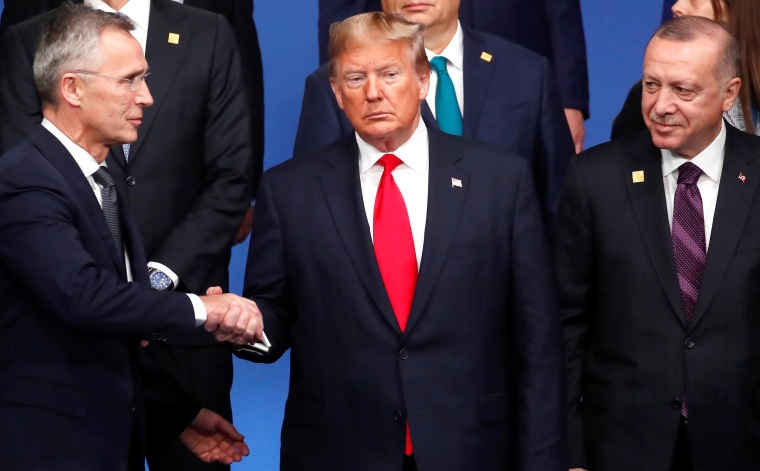Europe tries to Trump-proof itself as Putin’s war in Ukraine looms over NATO
LONDON — November’s presidential election may be nine months away, but Europe is already trying to Trump-proof itself, officials on the continent have told NBC News, fearing what a second term for the Republican might mean for America’s closest allies.
During his first four years, former President Donald Trump shocked the Europeans by upending the transatlantic balance on which the postwar Western world was built. Their main concern is that a reelected Trump would double down — halting aid to Ukraine and reneging on Washington’s promise to defend its NATO partners — to leave them more vulnerable to attack by Russia.
“If Trump were reelected, we would face a situation in Europe that has not occurred since the end of the Second World War,” said Norbert Röttgen, a veteran German lawmaker and ex-chair of the Bundestag’s foreign affairs committee. “Europe would have to stand up for its own security in an unprecedented way.”
The paradox is that many of these critics, while reviling Trump’s tactics, rhetoric and motives, actually agree with his central point: Europe has for too long depended on the United States’ military might and geopolitical influence. The prospect of Trump back in the White House has only lent new urgency to those driving this effort, particularly in light of recent indications that he might be happy to leave Russian President Vladimir Putin free reign to act aggressively at home and abroad.
Europe is far from united, however, with an expected far-right surge in June elections led by nationalist parties that share Trump’s Ukraine skepticism. On the other side of the aisle, those who want to bolster Europe’s defenses know it would be a costly, complex and lengthy process — hence the fierce debate currently raging over how to do so.
“Nothing should be off the table to enhance Europe’s sovereignty in the face of a possible second Trump term,” said Valérie Hayer, a senior European Parliament lawmaker from France.
“Europe has relied on the U.S. to provide its security for too long,” said Hayer, who leads the Renew Europe group, and is French President Emmanuel Macron’s top lawmaker in Brussels. “It’s high time for Europe to improve its own deterrence capacities and take its security into its own hands.”
Many here believe that Trump would be economically protectionist and perhaps even launch new trade wars against Europe. But by far their main concern is about defense — namely against Russia.
Europe’s economy dwarfs that of Moscow’s, but since the Cold War it has relied on the U.S. for defense against the Kremlin. Its two nuclear powers, the United Kingdom and France, have relatively small and untested arsenals, illustrated by the revelation this week that Britain recently had a failed nuclear submarine test launch. Europe’s conventional forces, meanwhile, would provide scant protection in a full-scale land war without American backing.
Washington’s NATO allies have in recent years increased defense spending, spurred by Putin’s invasion of Ukraine. But Trump’s blunt ultimatum to NATO — pay more or we would not protect you — has convinced many across the continent that they need to accelerate and coordinate the production and supply of weapons.
Jason Miller, a senior advisor to Trump, criticized Biden’s record in Europe, and said the president had presided over “death and destruction” on the continent.
“President Trump got our allies to increase their NATO spending by demanding they pay up, but Joe Biden went back to letting them take advantage of the American taxpayer,” he said in a written statement. “When you don’t pay your defense spending, you can’t be surprised that you get more war.”

The former president may have focused minds, but he is not the sole cause of the reckoning European leaders are undergoing.
Many in Europe recognize that, even if President Joe Biden wins in November, the isolationist ideas that Trump popularized among some Republicans will not disappear. European leaders and officials are, in this sense, not so much insulating themselves against a potential Trump administration but against a new normal in transatlantic relations.
Leaders are also facing equivocating support among the European people themselves when it comes to support for Ukraine. More people now back a negotiated peace with Russia than they did last year, according to January polling of 17,000 people across 12 countries by the European Council on Foreign Relations think tank.
The impending election “is a wake-up call” for Europe, said Dominic Grieve, a former…
Read More: Europe tries to Trump-proof itself as Putin’s war in Ukraine looms over NATO

